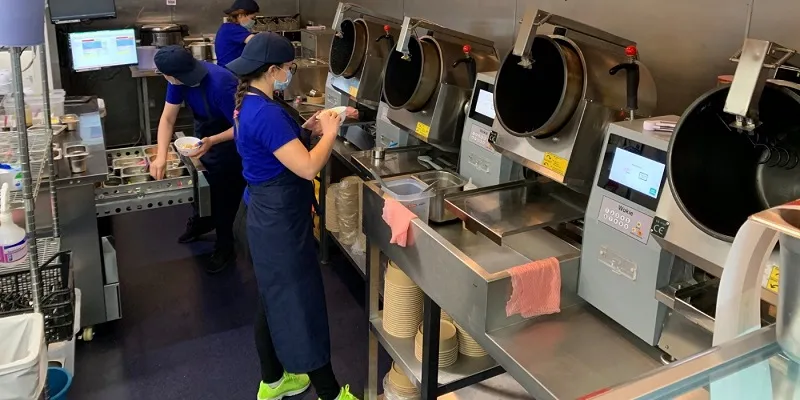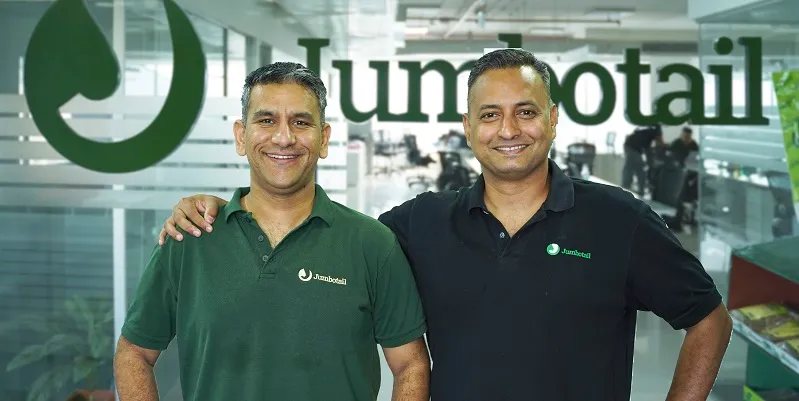Rebel Foods is tapping IoT to scale its QSR chain
Working with AWS, Rebel Foods has built an IoT platform that allows it to automate cooking processes, and keep track of inventory, procurement, manufacturing, warehousing, and more.
Good morning!
Behrouz Biryani, Mandarin Oak, Oven Story, and Sweet Truth — these are just some of the QSR brands operated by Rebel Foods, which believes it was born out of the marriage of great food and innovative tech.
The largest cloud kitchen restaurant chain in India began life as a brick-and-mortar business with one brand, Faasos, in 2011. Today, it operates more than 350 cloud kitchens in India, as well as in the UAE, South East Asia, and the UK.
Now, the Mumbai-based dark kitchen company is looking to further leverage tech, in particular IoT, AI, and robotics, in all its cloud kitchens. Computer vision and AI is helping chefs at Rebel Foods automate the entire cooking process, courtesy some ‘very intelligent equipment’ — a robotic wok and dum machine, and automated tawas and auto fryers.

Automated Dark Kitchens named Wokie by Rebel Foods
“We created a tech platform that works as the core. Culinary delight and technology are the two big pieces inside our operating system’s puzzle. From procurement and warehousing to supply chain, kitchen ops, and delivery, everything runs on a platform that has been built in-house by our tech and product teams,” says Soumyadeep Barman, Chief Product Officer and Co-founder, Rebel Foods.
These intelligent machines have been installed in 50 kitchens, and the cloud kitchen operator plans to roll them out in 100 more kitchens in FY22.
The Interview
The journey of Microsoft for Startups’ initiative, Highway to a Hundred Unicorns, began at India Internet Day, one of India’s largest conferences for internet entrepreneurs. The initiative has been working towards empowering the startup ecosystem of Tier-II cities in India for the last three years. In 2020, even as the pandemic raged on, the programme went beyond India and extended to the Asia-Pacific region to strengthen the region’s startup ecosystem. In an exclusive interaction, Lathika Pai, Microsoft’s Country Head, Venture Capital and Private Equity Partnerships, tells in detail about the unique initiative.
Editor’s Pick: 100X Entrepreneur podcast
Third generation apple farmer Ashish Jhina and military veteran Karthik Venkateswaran co-founded online wholesale marketplace Jumbotail, aiming to change the way food and grocery are bought and sold in the country. At present, the startup serves over 30,000 kirana stores across India with its full-stack B2B ecommerce model. In this episode of the 100X Entrepreneur podcast, the co-founders talk about their journey as entrepreneurs, launching Jumbotail, and more. Read more.

S Karthik Venkateswaran (R) with co-founder Ashish Jhina (L) started Jumbotail in 2015.
Startup Spotlight
This village boy-turned-entrepreneur is building ‘Bharat Ka Online School’
While growing up in a farming family in a Haryana village, Tarun Saini had to travel 35-40 km for tuitions. After making a dent in the Australian education space, when he returned to India in 2018, he discovered that despite the growth of online learning, the situation hadn’t improved much in villages and small towns since he left. While most quality education was imparted in English, the demand-supply gap in after-school learning for students studying in state boards was massive. To solve this problem, Tarun founded Vidyakul in August 2018. Read more.

Vidyakul Founder Tarun Saini (R) with Co-founder Raman Garg
News & Updates
- According to sources, Flipkart is in the advanced stages to acquire online travel aggregator Cleartrip in a deal valued at around $40 million. The transaction is expected to be a part cash and part equity deal.
- The Finance Ministry said that fundraising through public and rights issues surged 115 percent and 15 percent, respectively, in 2020-21, highlighting India's resilience towards disruptions caused due to COVID-19.
- 42 startups across multiple domains have been selected from 6,700 applications in 'CHUNAUTI' screening contest, and will be eligible for benefits under the Next Generation Incubation Scheme.
- A Barclays report states that localised lockdowns in key economic hubs mid the second COVID-19 wave can cost the economy an average of $1.25 billion each week. The cumulative loss of economic and commercial activity till May end could be around $ 10.5 billion.
- Facebook has set up an independent board to look into hate speech and other undesirable content on the platform. The board will now accept cases and complaints from Facebook and Instagram users.
Before you go, stay inspired with…

Soumyadeep Barman, Co-founder of Rebel Foods
“Whatever we do, we look at it from a customer lens. It might require some amount of capex and investment in people, teams, and machines, but at the end of the day, we want our customers to love our products.”
— Soumyadeep Barman, Chief Product Officer and Co-founder, Rebel Foods
Now get the Daily Capsule in your inbox. Subscribe to our newsletter today!







